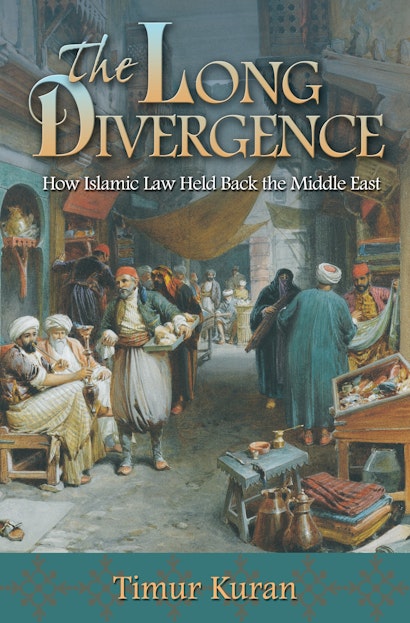In the year 1000, the economy of the Middle East was at least as advanced as that of Europe. But by 1800, the region had fallen dramatically behind—in living standards, technology, and economic institutions. In short, the Middle East had failed to modernize economically as the West surged ahead. What caused this long divergence? And why does the Middle East remain drastically underdeveloped compared to the West? In The Long Divergence, one of the world’s leading experts on Islamic economic institutions and the economy of the Middle East provides a new answer to these long-debated questions.
Timur Kuran argues that what slowed the economic development of the Middle East was not colonialism or geography, still less Muslim attitudes or some incompatibility between Islam and capitalism. Rather, starting around the tenth century, Islamic legal institutions, which had benefitted the Middle Eastern economy in the early centuries of Islam, began to act as a drag on development by slowing or blocking the emergence of central features of modern economic life—including private capital accumulation, corporations, large-scale production, and impersonal exchange. By the nineteenth century, modern economic institutions began to be transplanted to the Middle East, but its economy has not caught up. And there is no quick fix today. Low trust, rampant corruption, and weak civil societies—all characteristic of the region’s economies today and all legacies of its economic history—will take generations to overcome.
The Long Divergence opens up a frank and honest debate on a crucial issue that even some of the most ardent secularists in the Muslim world have hesitated to discuss.
"Kuran's book offers the best explanation yet for why the Middle East has lagged. After poring over ancient business records, Professor Kuran persuasively argues that what held the Middle East back wasn't Islam as such, or colonialism, but rather various secondary Islamic legal practices that are no longer relevant today."—Nicholas D. Kristof, New York Times
"This is a book to be not just tasted but chewed and digested. Instead of facile claims that Islam is the solution or Islam is the problem, readers get a detailed history of economic institutions in the Middle East as compared to those in the West. Kuran shows that the Islamic law and practices underlying Middle Eastern commerce worked well for a long time and were much more flexible than usually assumed. . . . Clearly presented quantitative data and illuminating anecdotes add up to a fine feast."—L. Carl Brown, Foreign Affairs
"Kuran's arguments have broad implications for the debate about how to foster economic development. He demonstrates that the West's long ascendancy was rooted in its ability to develop institutions that combined labour and capital in imaginative new ways."—The Economist
"Kuran's thesis is contentious; but it does provide us with an incentive to reformulate Islamic law. It is an excellent starting-point for a debate long overdue."—Ziauddin Sardar, The Independent
"The Long Divergence offers a pathbreaking analysis of why the flourishing premodern economies of the Islamic world fell into relative decline as Western Europe rose. And it explores the issue of whether conservative Islam is compatible with modern economic institutions. You'll be surprised by many of his conclusions."—Peter Passell, Milken Institute Review
"A ground-breaking book. . . . Kuran argues Islamic law primarily failed to develop the concept of a corporation: an economic and legal construct, separated from family and tribal loyalty, designed to encourage investment and profit sharing."—Chris Berg, Sydney Morning Herald
"In an interesting new book called The Long Divergence, Timur Kuran of Duke argues that Islam's economic restrictions, rather than its cultural conservatism or isolationism, stunted development in countries where it was the dominant religion."—Massimo Calabresi, Time.com's Swampland blog
"[The Long Divergence] explains a large part of why the Middle East and Turkey fell behind the West and law and economics has a lot to do with it. Various laws in Islamic societies were not conducive to large-scale economic structures, at precisely the time when such structures were becoming profitable and indeed essential as drivers of economic growth. This is not a book of handwaving but rather he nails the detail, whether it is on inheritance law, contracts, forming corporations, or any number of other topics."—Tyler Cowen, Marginal Revolution
"Ground-breaking. . . . In this wide-ranging study, Kuran explores other possible factors which favored the non-Muslim business ethos over the Islamic one, but as a true scholar he rehearses other possible explanations."—Arnold Ages, Chicago Jewish Star
"Timur Kuran is an avid reader of Islamic economic and legal history and an immensely well informed scholar. This latest work not only combines his earlier arguments but also provides some new perspectives."—Murat Cizakca, EH.Net
"An invaluable contribution to the debate."—Choice
"This is a most informative book and may make contemporary Muslims wonder whether a forthcoming second codification of Islamic law should heed some of the warnings of the author."—Murat Çizakça, MESA Bulletin
"Kuran deserves to be lauded for providing a narrative for how certain Middle Eastern institutions negatively affected economic outcomes. This book represents an advance in our understanding of the functioning of commercial institutions in the Middle East and of their dynamic consequences. . . . Kuran has provided an important scholarly resource for both academics and those interested in the economic and political development of the region more broadly."—Eric Chaney, Development and Change
"By eschewing simple explanations and challenging scholars to look at such heated topics as the Capitulations in a new light, Long Divergence offers a new window on an old dogma. In a time when there is a trend to blame much of the Middle East's problems on Western meddling, it is important that scholarship swims slightly against the current in shedding new light on questions of modernity and the reasons behind economic stagnation in the Muslim world."—Seth Frantzman, Digest of Middle East Studies
"The Long Divergence is an excellent book that should be of great appeal to scholars interested in the Middle East and its history, economic historians interested in the general question of why some regions failed to modernize, and social scientists interested in the historical and institutional roots of comparative underdevelopment."—Metin Cosgel, Journal of Economic History
"In this beautifully crafted book, Timur Kuran provides a remarkably rich analysis of how Islamic law impeded economic progress in the Middle East and North Africa. Kuran's views are fresh and powerful, and they are subtle."—Jack A. Goldstone, Perspectives on Politics
"The Long Divergence is a bold and stimulating book, based on a prodigious amount of research in world economic history. It is the first work of its kind to wrestle with the big question about the Middle East's economic path. . . . Though it may stir up controversy among those who may not take well to his critique of Islam, this landmark study will find a broad readership to debate its provocative conclusions."—Ghislaine Lydon, Global History
"A major achievement that should be read by everyone with an interest in the region, as well as by scholars in economic history and institutional economics."—Mark Koyama, Public Choice
"Sophisticated, purposive, and insightful, this book brings the powerful thinking of an economist to bear on a central question of Middle Eastern history. The argument is lucid and compelling; anyone with a serious interest in the way the world has changed in recent centuries will find this book rewarding."—Michael Cook, author of A Brief History of the Human Race
"The Long Divergence is a turning point in the understanding of Middle Eastern economic history and a must-read for everyone interested in economic development in the Islamic world more generally."—Avner Greif, Stanford University
"Kuran's book is a wonderful resource for anyone interested in the Middle East and the Islamic world. The path toward economic and legal reforms for the Islamic world can only be charted by understanding the historical impediments to economic development in the region. There is currently no better starting point to contemplate such reforms and development efforts than this book."—Mahmoud El-Gamal, author of Islamic Finance: Law, Economics, and Practice


